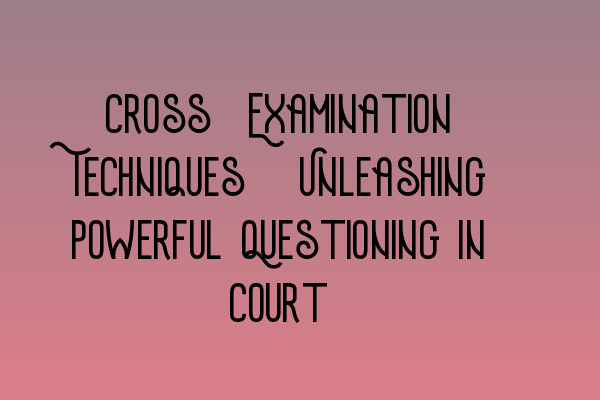Cross-Examination Techniques: Unleashing Powerful Questioning in Court
Welcome to SQE Criminal Law & Practice Law UK! In this blog post, we’ll explore the art of cross-examination and how to unleash powerful questioning in court. Cross-examination is an essential skill for any solicitor, as it allows you to challenge the evidence presented by the opposing party and uncover the truth. By employing effective cross-examination techniques, you can strategically control the narrative and persuade the court in your client’s favor.
Before we dive into the techniques, it’s important to ensure you have a solid understanding of the SQE exam and the essential study materials required. Check out our article on SQE Exam Prep: Essential Study Materials for Aspiring Solicitors to set yourself up for success.
The Foundation: Preparation
Successful cross-examination begins with meticulous preparation. To effectively question a witness, you need a thorough understanding of the case, the evidence, and the legal principles at play. Make sure you familiarize yourself with the Solicitors Qualifying Examination format by reading our comprehensive guide on Demystifying the Solicitors Qualifying Examination Format.
Key steps in the preparation process include:
- Reviewing witness statements and evidence: Carefully analyze all available witness statements and evidence related to the case. Identify any inconsistencies, weaknesses, or gaps that you can exploit during cross-examination.
- Developing a cross-examination strategy: Based on your analysis of the evidence, develop a clear cross-examination strategy. Consider the key points you want to establish, the witnesses you need to challenge, and the order of questioning.
- Creating a detailed cross-examination outline: Prepare a comprehensive outline for your cross-examination, outlining the main points you want to cover and the specific questions you plan to ask. This will help you stay focused and organized during the actual examination.
Techniques for Powerful Cross-Examination
Now let’s explore some powerful cross-examination techniques you can employ to effectively challenge witnesses and present your case:
- Leading Questions: These are questions that suggest the desired answer. By using leading questions, you can control the witness’s responses and steer the narrative in your favor. For example, instead of asking “Did you see the defendant commit the crime?” you can ask “Isn’t it true that you saw the defendant commit the crime?”
- Impeachment: Impeachment is a technique used to undermine the credibility of a witness. You can impeach a witness by introducing prior inconsistent statements, highlighting biases, or exposing any ulterior motives they may have. This tactic can be particularly effective in discrediting the opposing party’s key witnesses.
- Contradictions: Look for inconsistencies in witness statements or discrepancies between the evidence and the witness’s testimony. By highlighting these contradictions, you can cast doubt on the witness’s reliability and credibility.
- Repetition: Repetition can be a powerful tool in cross-examination. By repeating key points or questions, you can emphasize certain facts or statements and reinforce their importance in the court’s mind.
- Non-Verbal Communication: Pay attention to the witness’s body language, facial expressions, and tone of voice. Non-verbal cues can sometimes reveal hidden emotions or discomfort, which you can exploit during cross-examination.
Remember, mastering cross-examination techniques requires practice and experience. The more you engage in cross-examination exercises and observe experienced solicitors in action, the better you’ll become at unleashing powerful questioning in court.
Further Resources
For a step-by-step guide on LLC formation in the UK, check out our articles on LLC Formation Made Simple: Step-by-Step Guide for UK Entrepreneurs and LLC Formation: A Step-by-Step Guide for UK Entrepreneurs. These resources will provide you with the necessary information to assist your clients in setting up their businesses effectively.
It’s also crucial to have a comprehensive understanding of business regulations in the UK. Refer to our article on Business Regulations in the UK: A Comprehensive Overview to navigate the legal landscape and ensure compliance.
Thank you for reading our blog post on Cross-Examination Techniques. We hope you found these insights valuable and that they enhance your skills as a criminal law solicitor. Stay tuned for more informative content from SQE Criminal Law & Practice Law UK!
